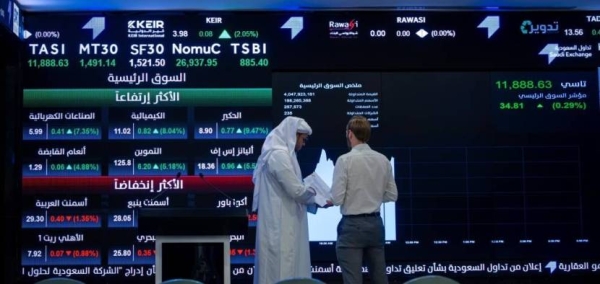The Saudi Stock Market main index Tadawul All Share Index (TASI) closed down during Monday’s session, dropping 33 points (0.3 percent) to reach 11,867 points. This decline was primarily driven by selling pressures from most stocks, particularly in the banking sector. Despite reaching a resistance level of 11,900 points during the session, the market was unable to stabilize, leading to continued selling pressures. This weak performance has resulted in the market being unable to recover from losses incurred over the past three sessions.
Trading values saw an increase of 31 percent, reaching SR5.4 billion, with small companies recording the highest trading value of SR2.7 billion. Medium companies were the least traded, with a value of SR1.2 billion, while large companies saw a decline of 0.17 percent. Out of the sectors, five saw an increase while the rest experienced a decline. Real estate traded funds led the gaining sectors with a 1.2 percent increase, while the media and entertainment sectors saw a decline of 2 percent. Banks had the highest trading value at SR989 million.
Foreign investors across all categories reduced their ownership in 111 securities listed on Tadawul, whereas their stake increased in 102 others. Ownership in the remaining sectors remained stable. This indicates fluctuations in foreign investment patterns in the Saudi Stock Market. Despite the variations in ownership, the market continues to face challenges in stabilizing and recovering from recent losses.
The Saudi Stock Market remains influenced by various factors, including global economic conditions, geopolitical events, and domestic policies. These external factors can contribute to fluctuations in stock prices and trading values. Investors in the market need to remain mindful of these influences and adjust their strategies accordingly to navigate the volatility effectively.
To optimize investments in the Saudi Stock Market, investors should conduct thorough research on individual stocks, sectors, and market trends. Diversifying investments across different sectors can help mitigate risks associated with market fluctuations. By staying informed and proactive in their investment decisions, investors can enhance their chances of achieving long-term financial growth.
Overall, the Saudi Stock Market continues to experience fluctuations, driven by both internal and external factors. While recent sessions have seen declines, trading values have shown an increase. Investors should carefully monitor market conditions, remain vigilant in their investment strategies, and seek expert advice when needed to make informed decisions and maximize their returns.


























